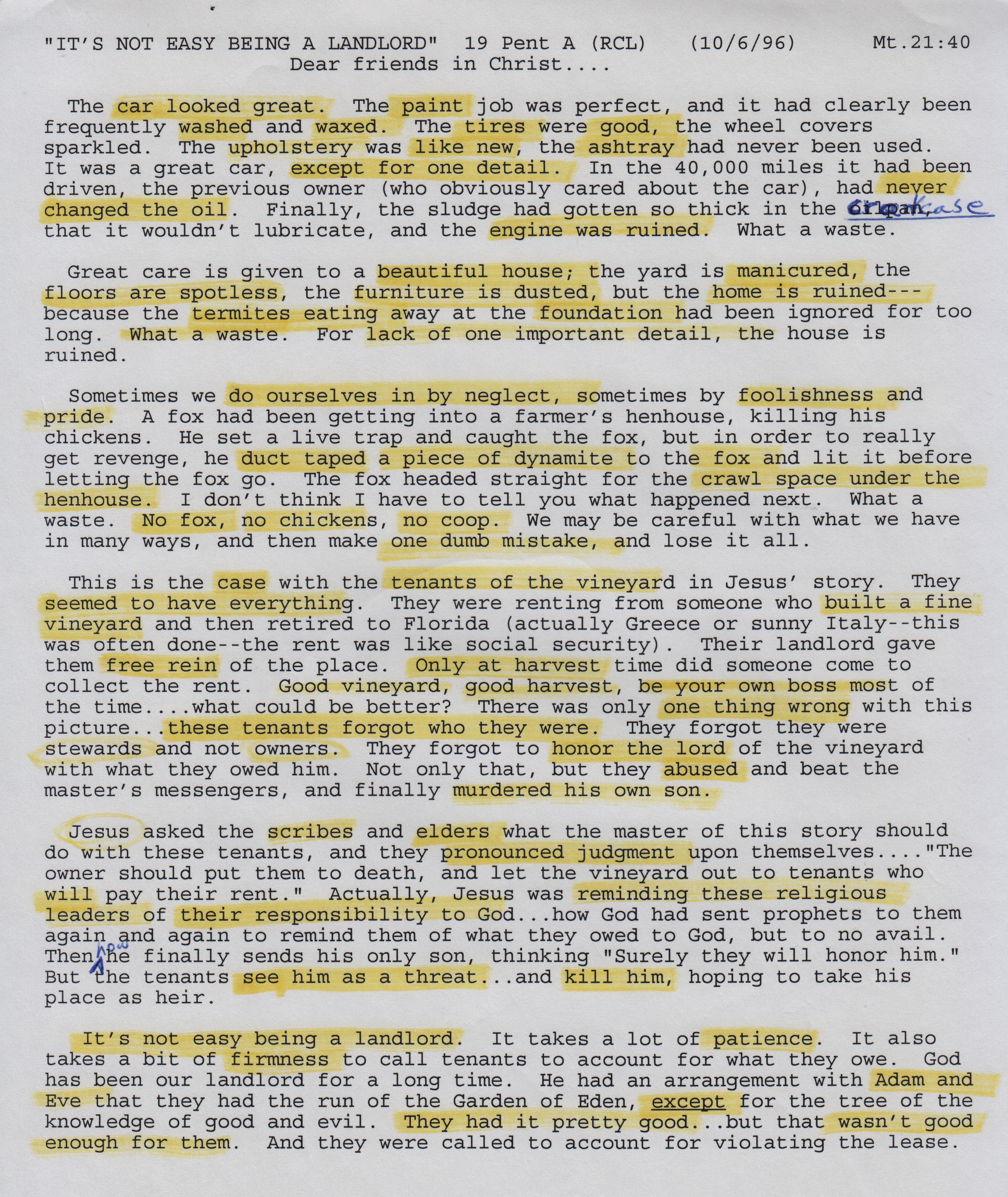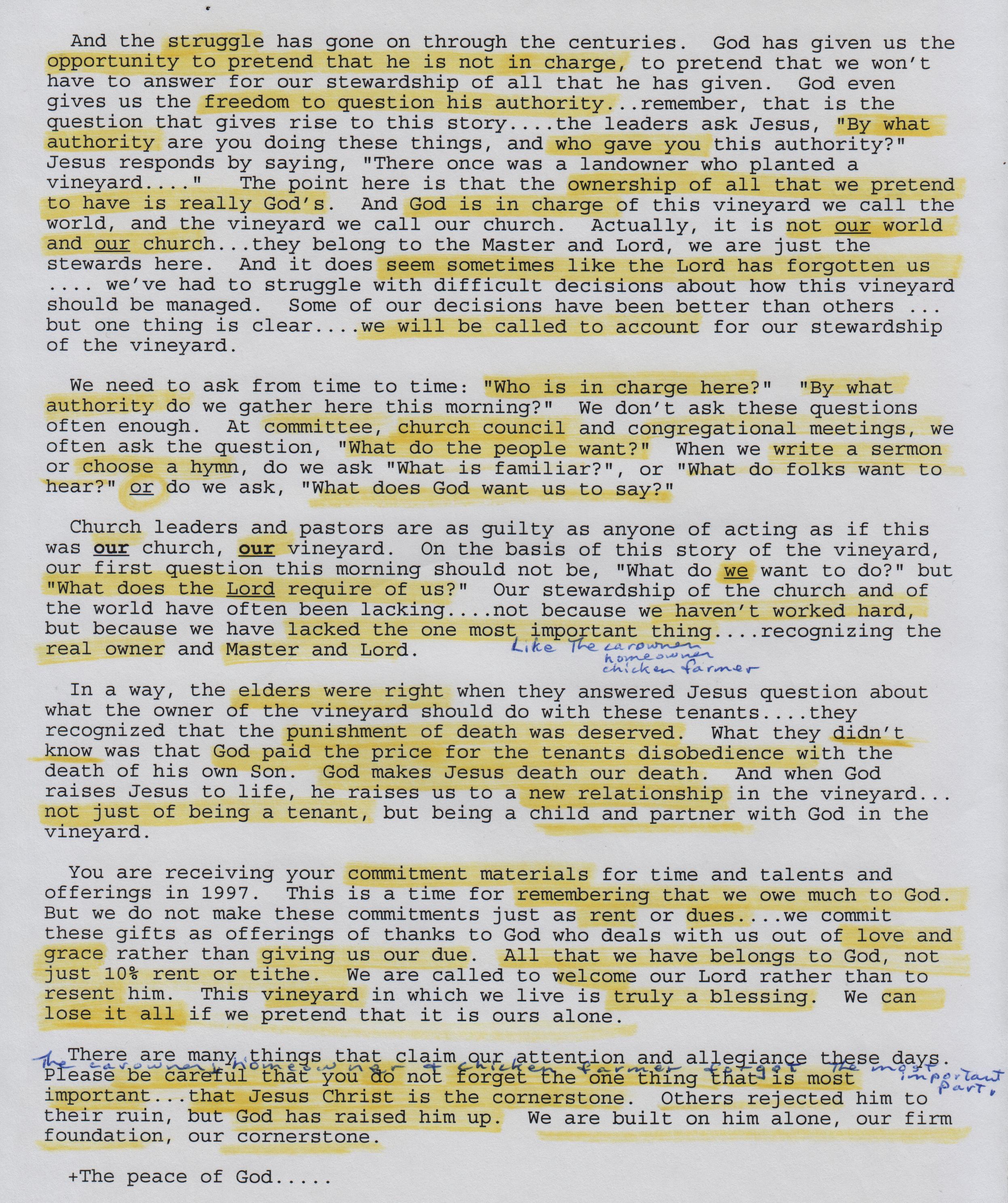This is a sermon from October of 1996 for the Pentecost season. It appears to be a sermon given around the time of the annual stewardship campaign.
The gospel text is listed as Matthew 21:40, and the filename of the sermon was “19PENTA.96R”, but the gospel text actually matches the 19th Sunday of Pentecost for Year A in the Revised Common Lectionary.
“IT’S NOT EASY BEING A LANDLORD” 19 Pent A (RCL) (10/6/96) Mt.21:40


Dear friends in Christ….
The car looked great. The paint job was perfect, and it had clearly been frequently washed and waxed. The tires were good, the wheel covers sparkled. The upholstery was like new, the ashtray had never been used. It was a great car, except for one detail. In the 40,000 miles it had been driven, the previous owner (who obviously cared about the car), had never changed the oil. Finally, the sludge had gotten so thick in the oilpan, that it wouldn’t lubricate, and the engine was ruined. What a waste.
Great care is given to a beautiful house; the yard is manicured, the floors are spotless, the furniture is dusted, but the home is ruined— because the termites eating away at the foundation had been ignored for too long. What a waste. For lack of one important detail, the house is ruined.
Sometimes we do ourselves in by neglect, sometimes by foolishness and pride. A fox had been getting into a farmer’s henhouse, killing his chickens. He set a live trap and caught the fox, but in order to really get revenge, he duct taped a piece of dynamite to the fox and lit it before letting the fox go. The fox headed straight for the crawl space under the henhouse. I don’t think I have to tell you what happened next. What a waste. No fox, no chickens, no coop. We may be careful with what we have in many ways, and then make one dumb mistake, and lose it all.
This is the case with the tenants of the vineyard in Jesus’ story. They seemed to have everything. They were renting from someone who built a fine vineyard and then retired to Florida (actually Greece or sunny Italy–this was often done–the rent was like social security). Their landlord gave them free rein of the place. Only at harvest time did someone come to collect the rent. Good vineyard, good harvest, be your own boss most of the time….what could be better? There was only one thing wrong with this picture…these tenants forgot who they were. They forgot they were stewards and not owners. They forgot to honor the lord of the vineyard with what they owed him. Not only that, but they abused and beat the master’s messengers, and finally murdered his own son.
Jesus asked the scribes and elders what the master of this story should do with these tenants, and they pronounced judgment upon themselves….“The owner should put them to death, and let the vineyard out to tenants who will pay their rent.” Actually, Jesus was reminding these religious leaders of their responsibility to God…how God had sent prophets to them again and again to remind them of what they owed to God, but to no avail. Then he finally sends his only son, thinking “Surely they will honor him.” But the tenants see him as a threat…and kill him, hoping to take his place as heir.
It’s not easy being a landlord. It takes a lot of patience. It also takes a bit of firmness to call tenants to account for what they owe. God has been our landlord for a long time. He had an arrangement with Adam and Eve that they had the run of the Garden of Eden, except for the tree of the knowledge of good and evil. They had it pretty good…but that wasn’t good enough for them. And they were called to account for violating the lease.
And the struggle has gone on through the centuries. God has given us the opportunity to pretend that he is not in charge, to pretend that we won’t have to answer for our stewardship of all that he has given. God even gives us the freedom to question his authority…remember, that is the question that gives rise to this story….the leaders ask Jesus, “By what authority are you doing these things, and who gave you this authority?” Jesus responds by saying, “There once was a landowner who planted a vineyard….” The point here is that the ownership of all that we pretend to have is really God’s. And God is in charge of this vineyard we call the world, and the vineyard we call our church. Actually, it is not our world and our church…they belong to the Master and Lord, we are just the stewards here. And it does seem sometimes like the Lord has forgotten us …. we’ve had to struggle with difficult decisions about how this vineyard should be managed. Some of our decisions have been better than others … but one thing is clear….we will be called to account for our stewardship of the vineyard.
We need to ask from time to time: “Who is in charge here?” “By what authority do we gather here this morning?” We don’t ask these questions often enough. At committee, church council and congregational meetings, we often ask the question, “What do the people want?” When we write a sermon or choose a hymn, do we ask “What is familiar?”, or “What do folks want to hear?” or do we ask, “What does God want us to say?”
Church leaders and pastors are as guilty as anyone of acting as if this was our church, our vineyard. On the basis of this story of the vineyard, our first question this morning should not be, “What do we want to do?” but “What does the Lord require of us?” Our stewardship of the church and of the world have often been lacking….not because we haven’t worked hard, but because we have lacked the one most important thing….recognizing the real owner and Master and Lord.
In a way, the elders were right when they answered Jesus question about what the owner of the vineyard should do with these tenants….they recognized that the punishment of death was deserved. What they didn’t know was that God paid the price for the tenants disobedience with the death of his own Son. God makes Jesus death our death. And when God raises Jesus to life, he raises us to a new relationship in the vineyard… not just of being a tenant, but being a child and partner with God in the vineyard.
You are receiving your commitment materials for time and talents and offerings in 1997. This is a time for remembering that we owe much to God. But we do not make these commitments just as rent or dues….we commit these gifts as offerings of thanks to God who deals with us out of love and grace rather than giving us our due. All that we have belongs to God, not just 10% rent or tithe. We are called to welcome our Lord rather than to resent him. This vineyard in which we live is truly a blessing. We can lose it all if we pretend that it is ours alone.
There are many things that claim our attention and allegiance these days. Please be careful that you do not forget the one thing that is most important…that Jesus Christ is the cornerstone. Others rejected him to their ruin, but God has raised him up. We are built on him alone, our firm foundation, our cornerstone.
+The peace of God…..